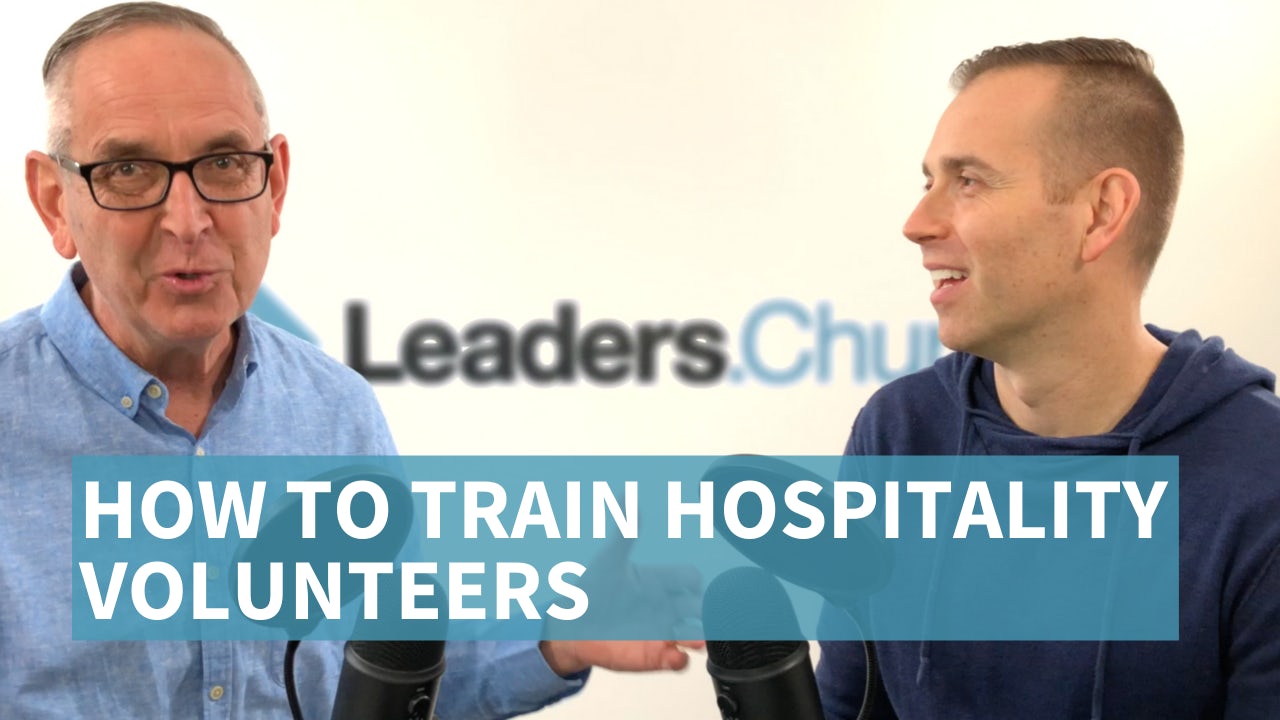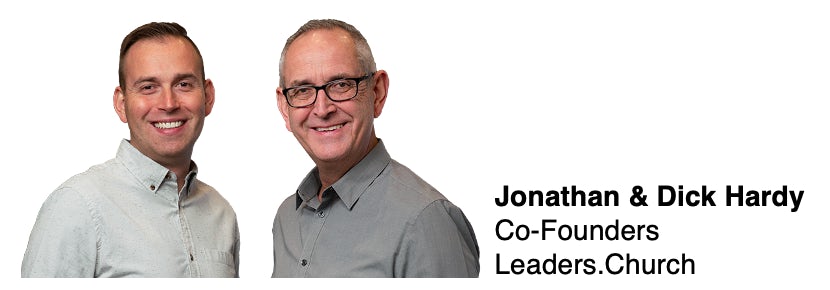017 – How to Train Hospitality Volunteers
What’s in this Episode?
Is it really that hard to welcome people? I mean, you wouldn’t think it’d be that hard to open a door and say hi to someone and give them a nice handshake, but for whatever reason, people mess this up all the time, giving a bunch of dead fish handshakes to people or squeezing someone’s hands so tight that it cuts off the circulation. That’s why training your first impressions volunteers is so important. And in today’s episode, we’re going to give you some tips on how to train hospitality volunteers.
Read the Transcript
Dick Hardy 0:30
You know, back a few years ago, I was called by a pastor down in Northwest Arkansas. This guy had been at the church, I’m gonna say maybe about 10 years, and was doing really a great job with it. However, the church had gone fairly flat in attendance and he was trying to push up to a new level. We had conversation about all sorts of things and one of the centerpieces that he realized he needed to put some emphasis on was training his hospitality and first impressions people. These were good people, but they really weren’t stepping up and taking the charge to create the best first impression. They weren’t taking it all that serious. And so we met with them on a Saturday morning, pulled a training together, and he had coffee, goodies, doughnuts, all that sort of stuff and I walked them through the process of what do you do on the parking lot? What do you do at the door? What do you do going into the auditorium in the sanctuary? What do you do after service? How do you interface this with kids and so on and so on. And literally we did the whole thing A to Z, we role played, all these things that first impressions, hospitality people were supposed to do. And in doing so, that church started on a journey, and I’m telling you, it was at least two years later, he is still talking about it. He is still talking about, “oh man, Dick when you came down and did that training, our people went to a brand new level.
Jonathan Hardy 1:55
So what you’re saying is it made a big impression.
Dick Hardy 1:57
Yeah, they had a great first impression with them! So, you know, we just talked about, in the last couple of episodes, the, episode 15 and 16, about the recruiting of volunteers specifically in hospitality. And so now we want to take this particular discussion and talk about, you know, how do you actually go through and train these volunteers. It’s one thing to recruit them, but now you have to train them. You cannot assume that they’re going to know all the things that you know, and you know, we’ve watched it happen. Jonathan and I are both into sports and, you know, we we watch March Madness and the NBA and Stanley Cup and World Series. He’s in Kansas City, so they just went nuts, go chiefs with the Super Bowl. And we watch all these things happen at the end of the season, but believe me, at the beginning of the season, training, training, training, and that’s what you’re about to hear today, as we talk about training our volunteers in the area of hospitality. So I’m gonna get started here with the first one. We’ve got six things we want to walk through.
Tip #1: Recognize The Need
Dick Hardy 3:06
First is you need to recognize the need. You need to know that until every volunteer knows how to do what you want done, your work is not done. I remember, in part of that training, I talked to the guys about how to shake a hand. You shake a hand with a grip. Now, here’s what you don’t do. You don’t give a little wimpy and you don’t break the person’s hand. You say, “well, I don’t have to tell people how to shake hands.” Yes, you do. Yes, you do. You have to talk to people about how to interact, explain everything. Take the time to walk through what you want and then you’ll be able to train at the level you want. What’s the second one?
Tip #2: Schedule Regular Training
Jonathan Hardy 3:55
All right, number two is to schedule regular training. So this really takes place in two different components. First of all, anytime someone new wants to join the hospitality or your first impressions team, whatever you call it, you have to make sure that you meet with them, either one on one or in a small orientation type setting right out of the gate. So that way you’re doing what you’re talking about. You’re training them, you’re showing them you’re walking them through the expectations, the process, all of what you want happening. I mean, you can’t just say, “okay, hey, you’re in. Go stand at that door.” I mean, there’s got to be that training there,
Dick Hardy 4:28
And that’s happening immediately.
Jonathan Hardy 4:30
Yeah! As soon as someone raises their hand and says, “hey, I’m in I want to join, I want to do this,” then there’s that first orientation type of training, but then there’s a second training that happens regularly, where people maybe, you know, it could be quarterly. It could be, you know, a couple times a year just depends on you know, what else you have going on in the church, but the point is, there needs to be regularly scheduled times of training, where it’s refreshers. It’s going back over the basics. You know, who’s the guy that was like, “you know, gentlemen, this is a football”?
Dick Hardy 5:02
That’s Vince Lombardi.
Jonathan Hardy 5:04
Vince Lombardi! Yeah. So you know, I mean, like the NFL players.
Dick Hardy 5:07
Great coach of the Green Bay Packers, once they had lost a game, he held up a football. And he said, gentlemen, this is a football. Now these were the best football players of their era, and yet, he explained.
Jonathan Hardy 5:21
Yeah, going back to the basics, the fundamentals, and that’s what this is here, we’re talking about some fundamental things. And one of those fundamentals that you need to do as you’re training them is, is to just help them see the basics. And make sure, well, let me stop for a second and say this, the reason you’re doing that is because you have to make sure people are always on the same page. I’ve even noticed this at our church. When in the wintertime, you know, we kind of have protocol for you know, where do the greeters stand? Are they outside in the freezing cold? Or are they inside opening the doors and we kind of have this threshold of, you know, if it’s a certain temperature, then we’ll go ahead and let them stand inside, but we want them outside as much as we can because it creates a greater presence and experience for people coming in, but obviously if it’s, you know, terribly cold where you just uncomfortable then, you know, we want to take care of the volunteers to. Well, what was happening is some people were staying inside, some people were staying outside. And so that’s where it’s like, we got to just keep getting back to the, the essentials, the core expectations. Here’s what we do. So point is, you have to schedule regular training. Okay. What’s number three?
Tip #3: Provide Written Job Descriptions
Dick Hardy 6:25
Well, number three is so basic, and you’ll think, “oh, my goodness, do I really have to do this?” Yes, you do. Provide written job descriptions. Now, you might say, “oh, my goodness, I’m just asking them to do this. I’m not saying you have to produce a five page job description. It may be a third of a page. But you’ve got to write down what it is that you’re calling them to do. Why it is, so you need to have your mission on there so they understand why it is that you’ve asked them and then give them one, two, three bullet points. And if you’ll do that, you’ll just forestall somebody going sideways on you. And you’re saying to yourself, in some cases right now, there’s no way something’s going to go sideways. He’s been around long enough. I’ve been around long enough to tell you, they will go sideways. You think you know what you’ve said. But what they’ve heard is not… Put it on paper. Written job descriptions.
Jonathan Hardy 7:23
Yeah, everyone wins when it’s clearly written on paper.
Dick Hardy 7:26
Number four.
Tip #4: Roleplay
Jonathan Hardy 7:27
All right, number four is roleplay. You know, you mentioned this a moment ago, but you want to take your volunteer people on your first impressions team to their spots, and you literally want to physically show them what to do. You can’t just point to them and say, “hey, go stand at that door, open the door, you know, you got to walk them through, here’s what to do. And then you know, even role playing the whole dead fish handshake versus the vise grips. I mean, it’s like, you know, you just got to roleplay and where do you want them to stand? And what do they do if, you know, depending on the role, what do they do if someone comes in and how does that look? As basic as we might think it is, it’s not understood by everyone. And that’s where it goes back to what I just mentioned a moment ago, where you have to just get all the expectations, everyone on the same page. So we know this is what we want in that role.
Dick Hardy 8:13
And when you’re doing these things, by the way, you’re training. These are best practices to train your hospitality people well, and that’s what we want through this.
Tip #5: Cross Train
Dick Hardy 8:24
The fifth one is really an important one in the sense of, to cross train. Now, you’re not necessarily going to have the person who works in preschool changing diapers, cross training with the bass player on the worship team, but you are going to have, I encourage you, we encourage you to have the person who’s serving in the babies and changing diapers to cross train with those who are working with the toddlers. And so that more than one person knows how to do more than one task. You end up with a bad weather day and you have to pull somebody from here to work over there. You want more volunteers knowing about more than just what they do. If you’ll do this, it really is going to strengthen their individual service in the role you’ve called them to, because it’s going to make them aware of the other ministries around.
Jonathan Hardy 9:16
And you might even be cross training within… you know, if you have a door greeter versus someone who’s in your sanctuary or auditorium and they’re seating people, you know, or the ushers, whatever, that may all fall under the same quote unquote, umbrella of ministry, but they’re two different roles. And so it’s important to cross train.
Recap:
Jonathan Hardy 9:35
Okay, so let’s do a quick recap here of the five things that we’ve talked about here today. One is to recognize the need. Two is to schedule regular training. Three, provide complete written job descriptions and ministry positions. Four is roleplay. Five is cross train.
Bonus Tip: (Tip #6: Repeat It Over and Over Again)
Jonathan Hardy 9:51
And then the final thing we want to mention is just repeat, basically do it over and over and over.
Dick Hardy 9:57
Repeat, repeat, repeat.
Jonathan Hardy 9:58
Yep. So what’s that quote? That “repetition breeds familiarity, familiarity breeds confidence and confidence breeds success.” So the point is we just have to do this repetition over and over and keep working on the fundamentals. These six things we just mentioned, or really five plus the repeat, they’re fundamentals, and so we want to do these six things over and over and over again. And that’s what’s going to give you success.
Dick Hardy 10:22
Well, and the best people in their fields, best people in business, best athletes, best students, best educators, they know to repeat and repeat and repeat and you get better and better all the time.
Jonathan Hardy 10:33
That’s right. Well, what else do we have to cover?
Dick Hardy 10:36
Well, I want to just talk about the fact that if you’ll check out the episodes that we just watched, so if you missed episodes, 15 and 16, be sure to go back and catch those episodes.
Jonathan Hardy 10:50
Those are on the seven steps to recruit your hospitality volunteers.
Dick Hardy 10:54
Exactly, exactly right. So you know, if you haven’t signed up for the Five Day Leadership Challenge, we strongly encourage you to do that. That’s going to help you be a better leader. It’s free to you. Just go to Leaders.Church/challenge. And certainly, if you haven’t subscribed to the podcast, we’d love to have you do that. We’re just thrilled to be able to provide resources for you. We hope and pray in the content we just talked about here today that you’ll be able to train your volunteers better and better as time goes on. So anything to add?
Jonathan Hardy 11:25
No, that’s it. Thanks so much for being with us today. We look forward to seeing you next time. Until then be blessed.









